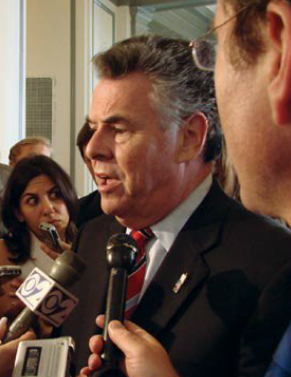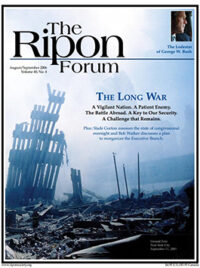Five years after the attacks that changed our Nation, America remains on alert
by CONGRESSMAN PETER KING

Since September 11, 2001, Congress has passed a number of important measures that have increased the security of our homeland. These include the Real ID Act, the passage and reauthorization of the Patriot Act, and the creation of the Department of Homeland Security (DHS) itself in 2003. But while these actions have made the United States a more secure nation, we must remain vigilant. There is still much more work to be done.
In recent months, the U.S. House of Representatives has continued to build on this record of accomplishments, passing the SAFE Port Act earlier this year, as well as the Border Security and Terrorism Prevention Act last December. As we’re all well aware, border security and immigration remain important national issues, and it is important to remember that the House led the way in calls for stronger border protections. Over the course of the summer, the House has conducted numerous field hearings and site visits to ensure that we find the right solution to the border security and immigration debate. The American people want Congress to adopt legislation that will allow us to regain control of our borders, and that is exactly what the House intends to do.
In May of this year, the Committee on Homeland Security passed another very important piece of legislation — our Hurricane Katrina “Lessons Learned” bill. Our plan will enhance the Federal Emergency Management Agency’s role and resources within the Department of Homeland Security, based upon the successful U.S. Coast Guard model. Like the Coast Guard, FEMA would be granted autonomy within the Department, while still allowing it ready-access to important DHS resources, including Customs and Border Protection, the Secret Service, and the Coast Guard itself. Our approach also mandates that the FEMA Director be a qualified and capable leader, as well as making a number of important preparedness, response, and emergency communications improvements at the federal, state, and local levels. In July, the Senate adopted a plan very similar to ours by an overwhelming 87-11 margin. As the House moves forward, I feel very strongly that our approach should be the centerpiece of reform.
While we work on enhancing our federal disaster response, it is important that we improve security across the country as well. In July, my committee brought forward a chemical plant security bill that increases security at chemical plants nationwide. The bill requires the Secretary of DHS to assess and rank chemical facilities based on risk and ensures that the highest-risk facilities meet stringent security requirements. If enacted into law, this bill will do a great deal to help ensure our nation’s chemical plants continue to operate safely.
Finally, the Committee on Homeland Security continues its push to ensure that homeland security funding is distributed on the basis of risk. Despite the seemingly obvious rationale, this has not been the case, with New York City and Washington, D.C., receiving 40 percent cuts in their anti-terror funding earlier this year. It’s simple, really — anti-terror funding should go to the areas with the greatest threat of terrorist attack. Cities and states should not be discriminated against because of a poorly written application, and grants should most certainly not be doled out based on some arbitrary political formula, as is the case with many first-responder programs. This has been a top priority of mine since I became Chairman last year, and I am determined to see Congress enact a solution. We cannot allow our high-risk cities and states to be shortchanged.
It has been five years since 9/11; but we can never let our guard down, never rest in our efforts to improve national security, and never forget the horrors of that day. Each and every day, we must do all we can to prevent a domestic terror attack from ever happening again. And I promise you that, as long as I am Chairman, the Committee on Homeland Security will continue to do all that we can to ensure that the American people remain safe and secure.
Peter King represents the 3rd District of New York in the U.S. House of Representatives. He serves as Chairman of the Homeland Security Committee.




